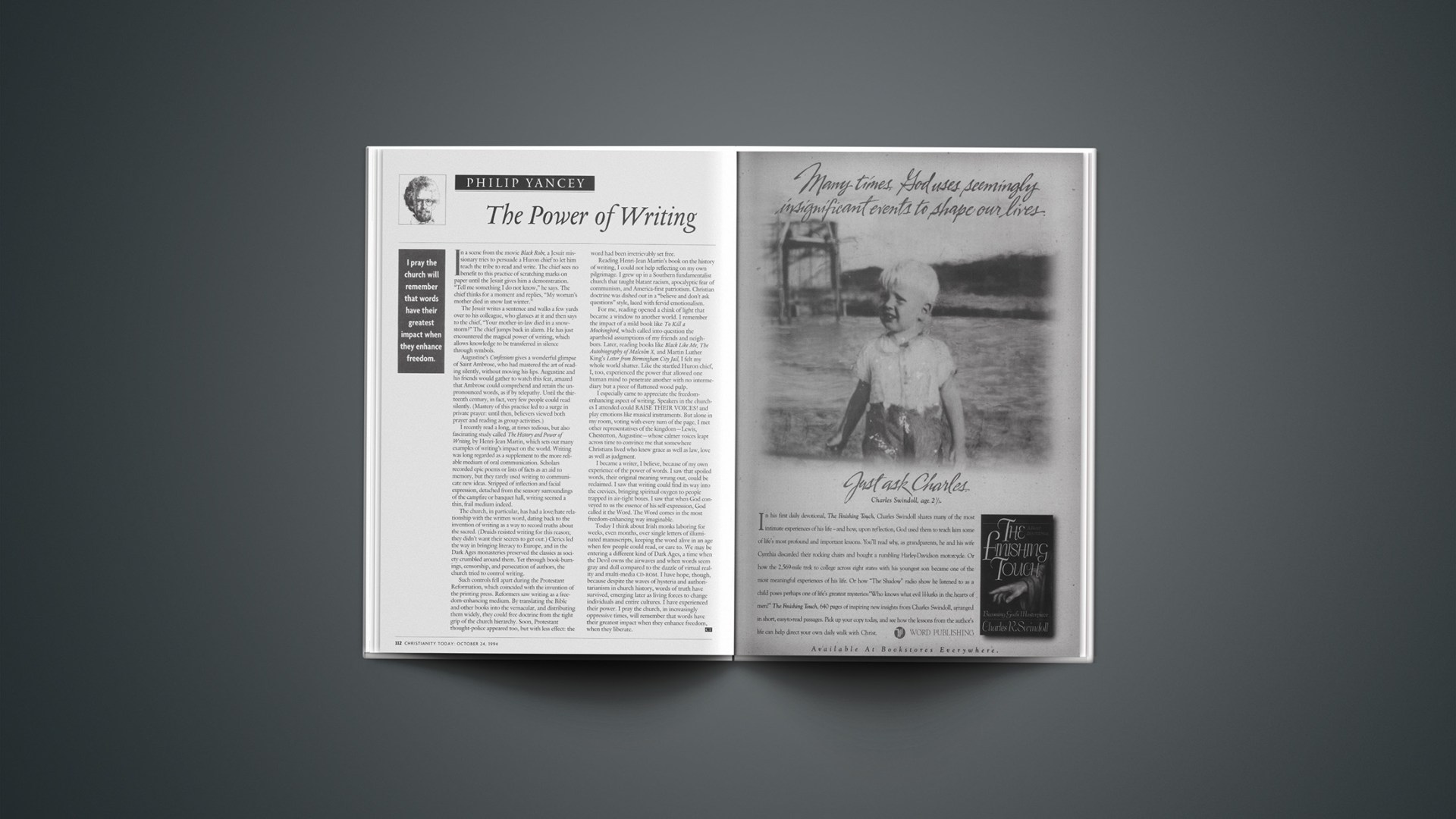In a scene from the movie Black Robe, a Jesuit missionary tries to persuade a Huron chief to let him teach the tribe to read and write. The chief sees no benefit to this practice of scratching marks on paper until the Jesuit gives him a demonstration. “Tell me something I do not know,” he says. The chief thinks for a moment and replies, “My woman’s mother died in snow last winter.”
The Jesuit writes a sentence and walks a few yards over to his colleague, who glances at it and then says to the chief, “Your mother-in-law died in a snowstorm?” The chief jumps back in alarm. He has just encountered the magical power of writing, which allows knowledge to be transferred in silence through symbols.
Augustine’s “Confessions” gives a wonderful glimpse of Saint Ambrose, who had mastered the art of reading silently, without moving his lips. Augustine and his friends would gather to watch this feat, amazed that Ambrose could comprehend and retain the unpronounced words, as if by telepathy. Until the thirteenth century, in fact, very few people could read silently. (Mastery of this practice led to a surge in private prayer: until then, believers viewed both prayer and reading as group activities.)
I recently read a long, at times tedious, but also fascinating study called “The History and Power of Writing,” by Henri-Jean Martin, which sets out many examples of writing’s impact on the world. Writing was long regarded as a supplement to the more reliable medium of oral communication. Scholars recorded epic poems or lists of facts as an aid to memory, but they rarely used writing to communicate new ideas. Stripped of inflection and facial expression, detached from the sensory surroundings of the campfire or banquet hall, writing seemed a thin, frail medium indeed.
The church, in particular, has had a love/hate relationship with the written word, dating back to the invention of writing as a way to record truths about the sacred. (Druids resisted writing for this reason; they didn’t want their secrets to get out.) Clerics led the way in bringing literacy to Europe, and in the Dark Ages monasteries preserved the classics as society crumbled around them. Yet through book-burnings, censorship, and persecution of authors, the church tried to control writing.
Such controls fell apart during the Protestant Reformation, which coincided with the invention of the printing press. Reformers saw writing as a freedom-enhancing medium. By translating the Bible and other books into the vernacular, and distributing them widely, they could free doctrine from the tight grip of the church hierarchy. Soon, Protestant thought-police appeared too, but with less effect: the word had been irretrievably set free.
Reading Henri-Jean Martin’s book on the history of writing, I could not help reflecting on my own pilgrimage. I grew up in a Southern fundamentalist church that taught blatant racism, apocalyptic fear of communism, and America-first patriotism. Christian doctrine was dished out in a “believe and don’t ask questions” style, laced with fervid emotionalism.
For me, reading opened a chink of light that became a window to another world. I remember the impact of a mild book like “To Kill a Mockingbird,” which called into question the apartheid assumptions of my friends and neighbors. Later, reading books like “Black Like Me,” “The Autobiography of Malcolm X,” and Martin Luther King’s Letter from Birmingham City Jail, I felt my whole world shatter. Like the startled Huron chief, I, too, experienced the power that allowed one human mind to penetrate another with no intermediary but a piece of flattened wood pulp.
I especially came to appreciate the freedom-enhancing aspect of writing. Speakers in the churches I attended could RAISE THEIR VOICES! and play emotions like musical instruments. But alone in my room, voting with every turn of the page, I met other representatives of the kingdom-Lewis, Chesterton, Augustine-whose calmer voices leapt across time to convince me that somewhere Christians lived who knew grace as well as law, love as well as judgment.
I became a writer, I believe, because of my own experience of the power of words. I saw that spoiled words, their original meaning wrung out, could be reclaimed. I saw that writing could find its way into the crevices, bringing spiritual oxygen to people trapped in air-tight boxes. I saw that when God conveyed to us the essence of his self-expression, God called it the Word. The Word comes in the most freedom-enhancing way imaginable.
Today I think about Irish monks laboring for weeks, even months, over single letters of illuminated manuscripts, keeping the word alive in an age when few people could read, or care to. We may be entering a different kind of Dark Ages, a time when the Devil owns the airwaves and when words seem gray and dull compared to the dazzle of virtual reality and multi-media CD-ROM. I have hope, though, because despite the waves of hysteria and authoritarianism in church history, words of truth have survived, emerging later as living forces to change individuals and entire cultures. I have experienced their power. I pray the church, in increasingly oppressive times, will remember that words have their greatest impact when they enhance freedom, when they liberate.
Copyright © 1994 Christianity Today. Click for reprint information.










